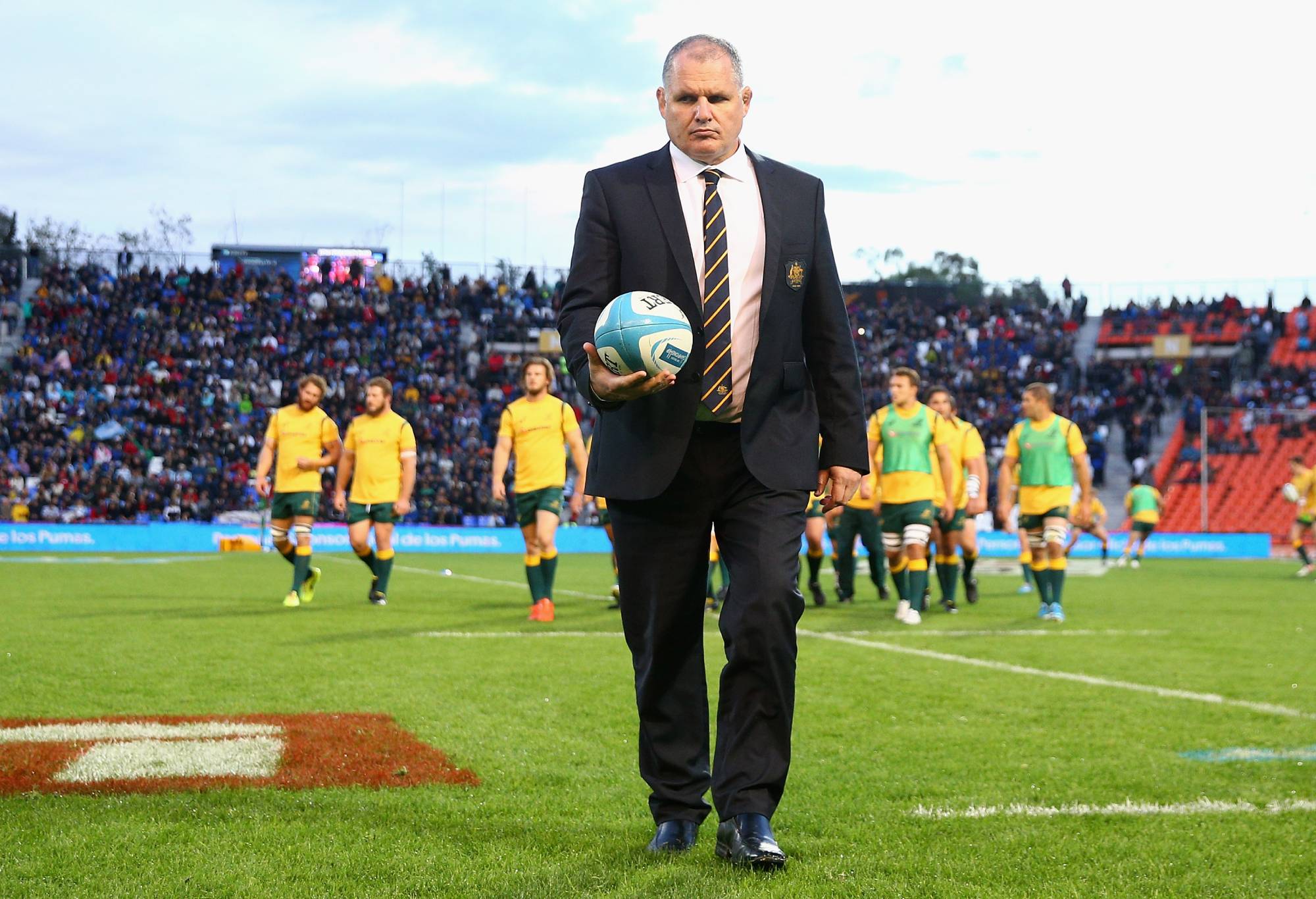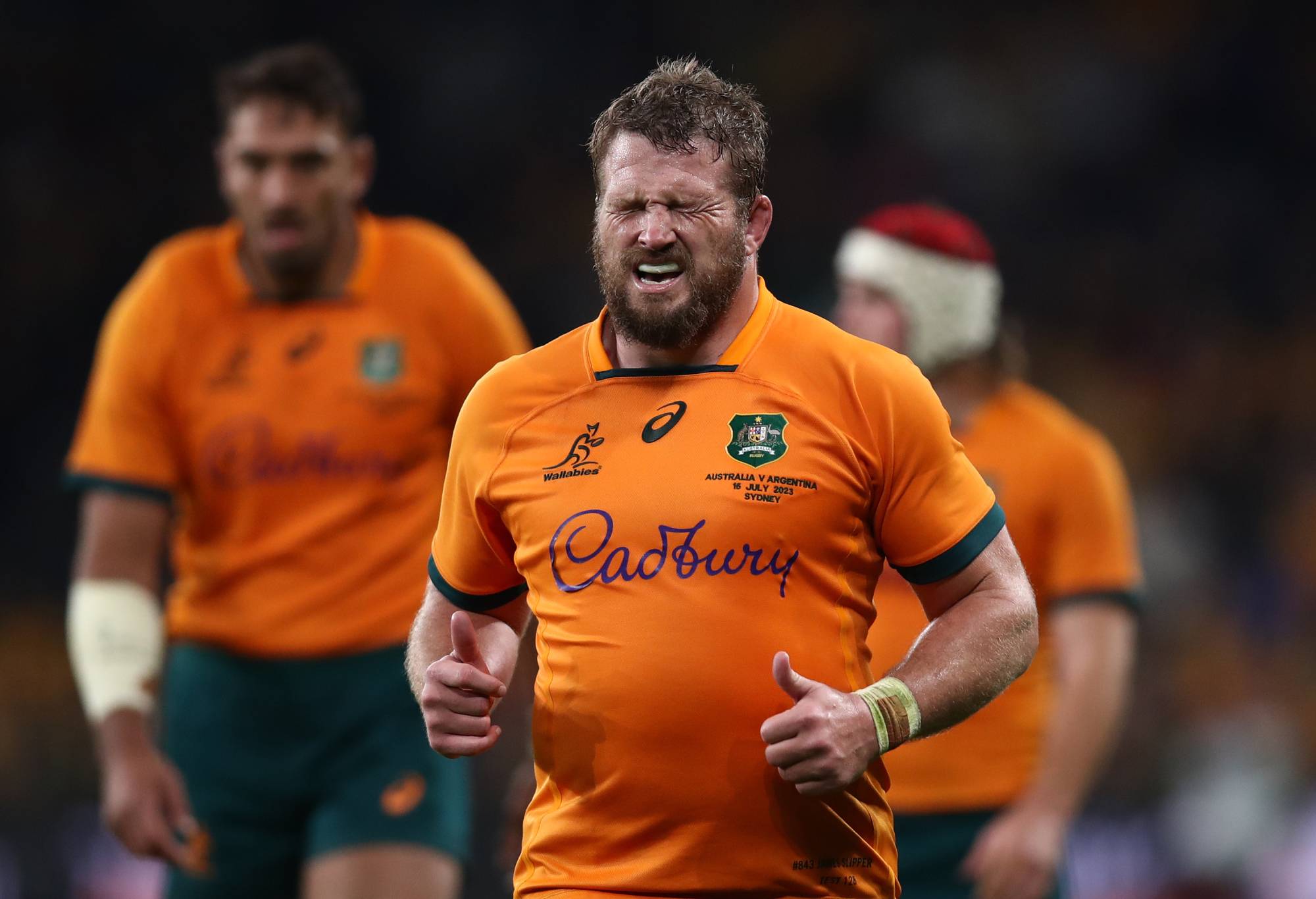In the grim winter of 2013 after a very disappointing, but narrow and controversial loss in a series to the British and Irish Lions, the Wallabies faced a coaching choice.
The incumbent had been fired. Who now to take the role? Then as now, it was the case that different head coaches have different strengths. Whilst a good coach is a good coach is a good coach, if you can match the particular strengths to the particular needs and qualities of the side you minimise your chances of an Eddie Jones fiasco; was he a smash and grabber or a slow, re-builder? There is a saying about history that I am trying to remember …
In 2013, if you needed a rebuild from the ground up, discipline restored and a focus on getting the basics done well, then Jake White at the ACT Brumbies had shown that he wasn’t just a South African phenomenon.
Over there he had apparently done something or other of note in 2007 with the hot mess left by Rudolf Straeuli, a man whose ears alone had conquered many, but who had proven tone deaf as national coach.
Does anyone still recall the existential joys of Kamp Staaldraad (rhymes with Stalingrad – another happy haunt), players being forced naked into fox holes together, whilst singing the national anthem and having freezing water poured over them? Bring Back Buck! Bugger that. Bring Back Straeuli! In fairness, Straeuli was a very fine player in his time, jug ears and all, but as we so often see, whatever makes a fine player does not always, or even often, make a fine coach.
If you felt that Australian rugby was basically sound and it was more of a case of rebuilding some relationships between players and coach, rather than a more-old school approach (even if not the full Straeuli) and basically a tune up rather than a rebuild, Ewen McKenzie, ‘Link’ of legend, was a clear choice.
Link had shown that as one of Australia’s greatest tighthead props, a great player actually could become at least a very good and, possibly, a great coach. He had taken sides that were fundamentally sound (New South Wales Waratahs, Stade de France) or on the improve (Queensland Reds) and really got them humming.
He had taken over the Waratahs from the hirsute and astute Bob Dwyer and led them to a brace of narrow losses in Super Rugby finals (by far the best performance at that time from a side that have been, mysteriously, perennial under achievers). He had survived five years at the Never-Wozzer-Tahs, which showed a capacity for political survival that is always a useful thing to have in the national snake pit.

Ewen McKenzie. (Photo by Cameron Spencer/Getty Images)
At Queensland he had taken a side of promising runtlings led by the underappreciated Phil Mooney and won their first title since the back-to-back triumphs of 1994 and 1995 in the Super Tens (where Herr Straeuli, popping up from time to time like Moriarty in Sherlock Holmes, made an appearance playing for Transvaal). Link had also shown a talent for political survival in a Queensland set up that led the way for Australian prime ministers by knifing seven coaches in 11 years prior to McKenzie of the Teflon skin.
In the hot tub of the Waratahs there was also the figure of Michael Cheika, aspiring perhaps to the role of Richard, Duke of Gloucester, looking to motivate the assorted stray cats playing for that side into a more cohesive force.
He had enjoyed success in Ireland with Leinster, winning a trophy in his first season and his performance in 2013 with the Waratahs suggested he was on his way to doing more than breaking doors at Bruce Stadium with them. The grizzled veteran of New Zealand rugger reporting, Wynn Gray, had noted Cheika seemed more of a change agent than a longer-term coach (after that burst of trophy winning stuff in his first season at Leinster performance did fall away). Cheika seemed to have built very strong rapport with the Waratahs players. If you felt the side needed a touch of crazy, some grub added, and a big dose of motivation then here was your (business) man.
So, what did Australia need in 2013? Because if you worked out what they needed, you would have more chance of matching the right coach to the right job at the right time.
In 2013 the Wallabies were ranked between 2nd and 4th in the world. In the 2007 Rugby World Cup they had been knocked out in the quarter final and in 2011 they had been knocked out by a superb New Zealand in the semi-finals – disappointing but arguably a side on an upward trajectory. They had not broken New Zealand’s stranglehold on the Bledisloe Cup, but they were a side with huge potential and, New Zealand aside, they won a lot more than they lost.
In Super Rugby, the ACT Brumbies were on the way back after some lean years and lost narrowly to a very fine Chiefs side in the 2013 Final. That was their second year under Jake White.
Queensland had won the Super Rugby title in 2011 under McKenzie, after some horrible wilderness years between about 2003-2009 (including a debacle in 2007 under … Eddie Jones). Queensland had a record of success against New Zealand Super Rugby sides. NSW were on the rebuild under Cheika and would go on to win the Super Rugby final in 2014. Both the Force and the Rebels were much as now, although the Force were building and in 2014 would just miss out on the finals of Super Rugby, something too many of their detractors ignore.
In 2013 some of the players available to the national coach included Will Genia, Quade Cooper, Michael ‘Squeak’ Moore, David Pocock, Michael Hooper, James Horwill, Rob Simmons, James Slipper, Scott Sio, Adam Ashley-Cooper, James O’Connor, Berrick Barnes, Digby Ioane and Israel Folau. This was a side with significant flaws but whatever one thinks of any one of them, as a collective it is an impressive set of names.
Below that impressive roster there were some genuine issues and some of them should resonate today. The side had fitness and conditioning issues and always looked in danger of running out of puff against New Zealand and even some of the increasingly fit northern hemisphere sides. There is a school of thought that the flood of injuries in 2022 and 2023 were contributed to by the national coach having to work the squad hard because of varying levels of fitness. Some injuries are unavoidable of course.
Perhaps connected to the above, was what I call a ‘mentality’ issue. This shows as a tendency to give away streams of penalties and to be unable or unwilling to react to and read the referee in game. This might seem familiar. Also familiar was a tendency in tight games to give away points soon after scoring, something that is now an epidemic. Conceding points in the ‘championship minutes’ of each half against New Zealand was also a horror show stuck on repeat play – expand that to any close match now and ‘plus ca change’ as Rudolf Straeuli might mutter from the bottom of the nearest fox hole.
Another bugbear was a scrum that had serious perception issues with referees and that arguably was surprisingly naïve – it seemed to have few answers to such standard scrummaging noughties as rolling the shoulder on contact, using the outside bind to pull down and boring in. This proved destructive on many occasions, not least the deciding Lions’ Test of 2013. Yet the same scrum had helped win the second test under a different referee. The scrum now, to me, is more consistent but it still has a frightening tendency to go missing, as it did for example once James Slipper, as makeshift tighthead prop, went off against Wales in the 2023 Rugby World Cup.

(Photo by Jason McCawley/Getty Images)
Kicking from hand was another area that seemed short of best practice. Too often the decision making, and execution seemed witless. The sight of kicks without an effective chase and just being banged down the middle of the pitch – it is sporting to open the field up, after all- was too commonplace.
If kicking from hand was variable the same applied to kicking for points. It was not a debacle (James O’Connor and Kurtley Beale calmly potting penalties to win tests with the last kick of the game, if anyone recalls) but it was not reliably top tier either – the horror of the attempted penalty kick in the first Test of the Lions’ series in 2013 still has me imitating Marlon Brando in Apocalypse Now. Carter Gordon today (a fine player with a lot of promise I will add)?
Although Adam Ashley-Cooper had a long boot, like Reece Hodge, the ability to turn to him to reliably apply pressure through long penalty shots at goal was never really developed. Is there an Australian mentality that the penalty kick is a shameful way to score points? Is it seen as the equivalent of the under-arm ball, or the keeper breaking stumps when the dozy wander out of their ground the moment the ball has passed them? Is this a genetic disorder passed down the line, like a rugby version of Alport Syndrome, from rugby league?
Finally, there was a sense that promising young players didn’t really seem to improve over time in the national set up. If they came into the Wallabies with a weak left-right pass, it seemed to stay that way. If they stood up at the ruck, had a look about and waited until the break-away was bearing down on the fly-half before looping a pass to him, then they kept doing that. Problems not being ironed out at province or even before was also a big part of the picture. Sound familiar?
My take in 2013, when Australia was still winning more than it lost, was that the Wallabies needed a rebuild. The areas of weakness were not superficial – they went to the basics of how you win the game. That was a side that still had a world class lineout and a generally dominant ruck presence. It had a roster of world class players, albeit many with surprising frailties. It was not just a case of the side needing some tactical tweaks or a few hugs to make everyone happy again. The alternative argument, that things were basically sound could be made by pointing to the side’s general success and parts of the game that were strong. In the end I think we know where that rather optimistic view ended.
However, if I thought things needed more than a tune up in 2013, you can imagine that I am looking at the CVs of coaching prospects now with a very firm eye on people who have rebuilt sides, who can work with and develop younger players, who can instil a grip on the basics and who can communicate a clear plan so that we can see whether progress is being made.
What worries me is that there are good coaches available, but I don’t see anyone with the required skills to match. Darren Coleman at the Waratahs comes closest, but I don’t believe he has the experience or record yet to step up to the vast demands of the national job. There is still a bloke in South Africa whose name doesn’t rhyme with ‘Growlie’… And now I remember that saying about history – ‘It doesn’t repeat but sometimes it rhymes’.































































































